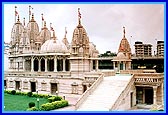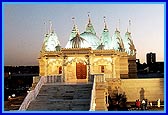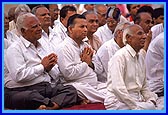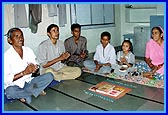| |
FAQs
- General Questions about Mandir
Mandir
- What is a mandir?
- Why mandirs are needed?
- Why build majestic mandirs?
Why spend so much money for mandirs?
- Why not schools and hospitals,
but mandirs?
- Why so many mandirs?
- Why build mandirs outside
India?
- How do mandirs help society?
- What cultural importance
mandir has?
- How does the mandir help
to create and maintain faith in God?
- How does the mandir help
a family?
- How does the mandir help
individuals?
Back
to Main
| |
Q.1
What is
a mandir?
A. Mandir is the
Hindu name for a place of worship or prayer. Mandir is a Sanskrit
word for where the mind becomes still and the soul floats freely
to seek the source of life, peace, joy and comfort. For centuries,
the mandir has remained a centre of life - a common community
place where people forget their differences and voluntarily
unite to serve society.
|
| |
Q.2
Why mandirs
are needed?
A.
Every religion in its own tradition builds houses of worship.
It is the mandir that fuels our faith in God, strengthen our society
and teach us to trust one another and to become trustworthy. Schools
will educate the mind, but who will educate the soul? Hospitals
will mend a broken arm, but who will mend a broken heart? Cinemas
and arcades will excite the mind but where will one go for peace
of mind? Mandir is a centre for learning about man, nature and
God. It is where ethics and values are reinforced. It is where
people celebrate festivals and seek shelter in sad times. It is
where talents in various arts - music, literature and sculpture
- are offered in the service of God.
|
| |
Q.3
Why build majestic mandirs?
Why spend so much money for mandirs?
A. When
buying a house for oneself and one’s family, one only requires
a one room square concrete box that has enough floor space to
sleep on. Yet, in reality, we spend weeks and months searching
for that perfect house that has the perfect color, perfect style,
perfect landscaping and perfect interior. Often, people spend
years saving up money and making plans for their dream house.
For ourselves and our loved ones, no cost or effort is spared
in our quest for the perfect home.
Then should it to be so surprising that those who love God would
spare no effort or cost to make the perfect house for God? This
has been the sentiment of Hindus since the time the ancient seers
wrote the Shilpa Shastras that specified the proper methods of
construction for elaborate mandirs. But the construction of the
mandir itself was the effect of devotion to God. So, the elaborate
features and exquisite carvings of the mandir were simply the
physical embodiments of devotion of the devotees who constructed
the mandir.
The government of every country spends millions of dollars on
public monuments that have no function other then to be looked
at and admired for their architecture. The money to construct
such public monuments comes directly from the taxpayers. Yet,
such massive expenditure on public monuments is accepted and appreciated
by all. The reason is that simply through their architecture and
symbolism, such public monuments promote pride in one’s
country and its values, and thus spread a beneficial social message.
In the same way that the architecture of public monuments, and
for that matter, all architecture promotes a message, the architecture
of a mandir also promotes a message that is spiritually and socially
beneficial. The architecture of the mandir evokes feelings of
purity, devotional fervor, faith, wonder at the splendor of God,
and pride in one’s culture.
Moreover, the money spent on mandirs does not come from public
coffers, but solely from the donations of devotees who desire
to express their devotion to God through the mandir. If society
admires wealthy people for the massive mansions and palaces they
construct to serve their own selfish needs, should not society
admire even more, those people from all backgrounds who selflessly
donate to the mandir for the socially beneficial message the mandir’s
architecture promotes.
|
| |
Q.4
Why not school and
hospitals, but mandirs?
A. Hospitals, schools,
and mandirs each play their respective essential roles in maintaining
society’s physical, mental, and spiritual well-being.
A hospital is necessary to treat the ill and wounded. A school
is necessary to educate the mind of the individual so that he
or she may become a successful and productive member of society.
However, neither the school nor the hospital can provide the social,
cultural, and spiritual benefits given by a mandir.
A school can give information, but it does not teach values. Perhaps
we should think about the following questions: Why is it that
so many social workers are faced with an ever increasing rate
of teenage pregnancies? Why do so many schools employ metal detectors
as security measures? Why is it that students attending the finest
universities in the world are arrested for drinking and driving?
A school will educate the mind, but unfortunately, it cannot educate
the soul.
A hospital can extend life but it cannot teach a person how to
live life. What are the success rates of smoking cessation or
alcohol abuse clinics? Patients suffer from lung cancer or liver
cirrhosis but they continue to consume nicotine and tobacco or
abuse alcohol. A criminal is treated for a gunshot wound. But,
after recovering he or she still remains a criminal. A hospital
can mend a broken arm, but unfortunately, it cannot mend a broken
heart.
Similarly, a mandir on its own cannot effectively fulfill the
purposes and roles attributed to either a school or a hospital.
However, a mandir can fulfill the deep necessity for spirituality
in today’s society.
Carl G. Jung, an eminent psychotherapist goes as far as saying,
“For the past thirty years people from all over the developed
world have come to me for advice. From amongst these people there
has not been one patient above the age of 35 whose illness could
not be cured by faith in religion. And there has not been a single
patient who has disbelieved religion and been cured!”
Swami Vivekanand, has said, “The greatest source of strength
for any society is its faith in God. The day it renounces such
faith will be the day that society begins to die.”
A mandir cultivates and sustains such devout faith in God. In
doing so, it teaches the individual to live life virtuously. It
teaches the individual to distinguish right from wrong. It molds
the character of the individual and teaches one to live life in
such a way that one does not harm one’s own self or society.
Therefore, mandirs, hospitals, and schools all have their respective
and essential roles in society. The need for mandirs is just as
visible as the need for schools and hospitals in society.
|
| |
Q.5 Why
so many mandirs?
A. Suppose
that one were away from home and visiting a foreign country. Suppose
that at this time one were to fall ill. One’s initial response
would be to find a hospital and seek medical treatment. However,
suppose that one were to discover that there is only one hospital
in the city. Not only one hospital in the city, but just one hospital
in the state. Not only just one hospital in the state, but just
one hospital in the entire country. How helpful would it be to
go to that hospital and stand in a line of hundreds if not thousands
of people? And, how helpful would it be to have to drive over
2-3 hours to reach that hospital?
Similarly, mandirs serve the purpose of a spiritual hospital.
They heal the diseases of the soul and nurture the soul on the
spiritual path. Therefore, many mandirs are built to ensure easier
accessibility to the individual. The easier the access that the
individual has to a mandir, the more inclined that individual
will be to go to a mandir and reap its social, cultural, and spiritual
benefits.
|
| |
Q.6
Why build mandirs outside
India?
A. For countless
generations Hindu values, customs and traditions have provided
man happiness and stability in his social, personal and spiritual
life. As Hindus migrate throughout the world in search of greater
economic opportunity, it is important that they do not lose this
source of stability and peace due to lack of contact with their
cultural heritage. Throughout the world, emigrants and, more significantly,
their future generations have been able to maintain contact with
their priceless cultural heritage through mandirs. Mandirs outside
of India have provided emigrants an essential place to keep in
touch with Hindu customs and traditions.
For second generation Hindus, the mandir has often been the place
where they have been introduced to such Hindu customs as the Hindu
diet, Hindu rites and rituals, Hindu dress, Hindu cultural ceremonies
and Hindu spirituality. Regular exposure to these customs and
traditions in the mandir has helped second generation Hindus understand
and appreciate their cultural heritage. This has helped them develop
pride in themselves and their cultural heritage and avoid the
psychologically destructive feelings of inferiority and isolation
that often come from being a part of a very small, misunderstood
minority. Pramukh Swami Maharaj has often said that "wherever
one goes, one should keep four aspects of our culture firmly rooted
in our life: our diet, our language, our dress, and our devotion."
|
| |
Q.7
How do mandirs help
society?
A.
Just as a mandir plays a vital role
in uplifting society spiritually and culturally, it also offers
various social benefits. The mandir has both a direct and indirect
influence on society.
Direct Influence:
The social influence of the mandir can be seen directly through
its role as a host for a variety of humanitarian activities.
The mandir is intertwined in each and every step of these activities.
It is the mandir campus which serves as the site for the activities
to be organized, launched and managed. It is the follower who
comes to the mandir that lends a helping hand in each and every
project. It is the resources of the mandir, its followers and
its well-wishers that are used to see each project through.
Historically, mandirs have not just remained centers of worship,
but rather, have evolved into vast, extensive complexes encompassing
many roles to serve the special needs of society. In addition
to their pivotal function in religious worship, mandirs have
been a place where pilgrims and the poor have turned to for
food in times of need or during natural disaster.

Today, BAPS has over 500 mandirs worldwide which play the role
of regional centers for humanitarian activities in the form
of anti-addiction, anti-dowry, family bonding, and literacy
campaigns. They also serve as regional centers of food and clothing
distribution, and supplies distribution during famines, floods,
earthquakes, cyclones, plague outbreaks, terrorist attacks,
or other times of disaster. BAPS is well known for its relief
work throughout the world. In natural calamities, BAPS volunteers
are among the first to arrive and the last to leave. In addition,
23 BAPS educational institutes educate over 6,000 students annually.
170,000 patients are treated at BAPS medical institutions. 209
tribal villages have been freed from addictions, superstition,
and poverty. However, all of these and many more such social
activities, have their direct roots at a mandir.
Indirect Influence:
Some social roles played by the mandir are not as noticeable
as described thus far. These roles become more apparent if we
examine the fundamental element of social uplift.
|
| |
Q.8
What cultural
importance does the mandir have?
A. Historically,
the mandir was a center for intellectual and artistic life. For
example,
throughout the history of Hindu civilization, mandirs have been
the most significant patrons of architecture, sculpture and painting.
The greatest architectural projects, the greatest sculptures and
paintings of every age have been associated with the construction
of mandirs.
Moreover, mandirs were also great patrons of the performing arts.
Mandirs supported the performance and teaching of devotional vocal
and instrumental music. Mandirs also promoted a tradition of devotional
dance. These traditions of music and dance were developed in the
mandir and spread out into the wider culture.
In addition to being a patron of the arts, the mandir was the
place where the public was routinely exposed to the arts. The
mandir was universally accessible. People from all backgrounds
and all places came to the mandir. There they experienced its
architecture, sculpture, painting, music and dance. It is through
this exposure to the arts at the mandir, that the artistic culture
of India became strongly rooted in the public’s mind. The
permanence of the mandir ensured that this artistic culture was
sustained in the public’s mind through generations.
In this way, through the ages, mandirs kept alive the highly-skilled
artistic traditions of India. Without the mandir’s patronage,
these priceless artistic traditions such as traditional stone-carving,
traditional architecture and Hindu classical music would not be
available for the world to appreciate today.
Mandir: Preserver of Scriptural Traditions
Hinduism has a vast ocean of scriptures that illuminate every
facet of human endeavor imaginable. But, most of these scriptures
were accessible only to the learned few due to language and availability
issues. However, it was through the mandirs, where the scriptures
were regularly read and discoursed upon, that the mass population
was given free and regular access to the stories, the epics, and
the scriptural tradition that was the foundation of their culture.
Thus, historically the mandir universalized the knowledge of the
scriptures by making that knowledge accessible to everyone.
Mandirs: Preserver of Language
Language is the key to culture. It is the key to unlocking the
history and teachings that have been preserved in the scriptures.
The death of a language such as Sanskrit, is equivalent to the
loss of thousands of years of human experience that has been recorded
in scriptures and books written in Sanskrit. Mandirs have preserved
the knowledge of Sanskrit throughout history through the establishment
of pathshalas (teaching centers) where the pupils learn Sanskrit
and the scriptures. From here they go on to teach it to others.
The fact that Bhagwan Swaminarayan has given this commandment
in His Shikshapatri illustrates how even the scriptures have indicated
the propagation of languages and learning as an important role
for mandirs. The mandir’s role in the teaching of languages
such as Sanskrit and, in mandirs outside of India, Gujarati and
Hindi, continues today.
Mandirs: Role in cultural life today
The cultural roles that mandirs have played throughout history
are being continued in today’s mandirs. In addition, today’s
mandirs have also risen to the challenge of promoting and protecting
the culture of today’s Hindus, both in India and throughout
the rest of the world.
|
| |
Q.9
How does the
mandir help to create and maintain faith in God?

A.
Faith
in God - Faith may perhaps be the most essential element
of the spiritual path. Without faith, one is unable to sustain
one’s belief system. Without faith, a spiritual aspirant
is unable to even accept the existence of God. One of the greatest
influences that the mandir may have on society is in its role
as a symbol of faith in God. Just as the experience of a university
increases an individual’s positive inclinations towards
education, the experience of the mandir increases an individual’s
faith in God.
A mandir is a place which through its natural activities inspires
many pious people to do a variety of spiritual things. It inspires
individuals to work at becoming better people. It inspires people
to pray to God. Naturally, when many religious people engaged
in a variety of spiritual activities are seen at mandirs, society’s
faith in God consequently increases.
The spiritual elevation of the individual
Another meaningful spiritual impact that the mandir has on society
is its impact on the individual. The mandir enhances the spiritual
progress of the individual. To understand this, we first need
to examine what spiritual progress is.
According to the Vasudev Mahatmya, a section of the Mahabharat,
the spiritual progress of an individual can be measured through
how much four components have been imbibed in the individual’s
life. These four components are dharma (righteousness), gnan (knowledge),
vairagya (detachment), and bhakti (devotion). In the Hindu scriptures
and in the Swaminarayan Sampraday, this is considered to be a
quotient of spiritual progress for any aspirant.
Dharma
Dharma is righteousness, or the practice of discretion between
right and wrong. To decide what is right and what is wrong, we
as humans naturally turn to a superhuman source of guidance, God.
In Hinduism, the scriptures are heeded as the word of God. They
are our encyclopedia of rights and wrongs.
The Swaminarayan mandir enhances one’s observance of dharma
by providing an environment which facilitates observing these
scriptural tenets. All of the devotees of the Swaminarayan mandir
strive to strictly follow these tenets. As a result, any individual
who regularly participates in the mandir’s activities is
also inspired to do so. Secondly, these tenets are also emphasized
in spiritual discourses regularly given at the mandir. Listening
to these discourses would inspire one to imbibe these tenets as
one understands their importance.
Gnan
Gnan is true knowledge. According to Bhagwan Swaminarayan, true
knowledge is to understand that one is the atma, which is pure,
eternal, and separate from one’s mortal and perishable body.
In the Shikshapatri, Bhagwan Swaminarayan has clearly stated to
His followers that the essence of all of the scriptures and the
ultimate means to salvation is to believe one’s self to
be the atma and worship Paramatma (God).
The mandir helps the individual to imbibe this true gnan through
scriptural readings and spiritual discourses. The Vachanamrut
and the Swamini Vato are the two basic scriptures of the Swaminarayan
Sampraday. They discuss the pitfalls and challenges that one may
face on the spiritual path and essentially better one’s
understanding of true spiritual knowledge. These two as well as
many other scriptures are regularly discussed, collectively studied,
and discoursed upon at all Swaminarayan mandirs.
In addition, the individual undergoes many practical experiences
by participating in the mandir’s activities. For example,
suppose that one is working on a given project at the mandir.
As the case in any work or volunteer environment, one’s
efforts may not bear their desired fruits or one’s advice
or opinions may not be heeded or accepted. As a consequence, one’s
feelings may be hurt or one’s ego may be humbled –
none of which should happen to one who has perfect gnan, or realization
of the atma. With a little introspection, these practical experiences
allow the individual to gauge his spiritual level and attempt
to enhance his or her imbibing of gnan.
Vairagya
Vairagya is detachment from the world. The mandir helps one imbibe
vairagya. The mandir offers the individual a setting where one
can forget his or her world and concentrate solely on God. The
unparalleled peace and happiness one experiences through participating
in religious activities and projects done with the purpose of
pleasing God, helps one build a conviction that there is more
happiness to be derived from God than from any material or worldly
entity. Thus, the mandir aids the individual in imbibing vairagya.
Bhakti
Bhakti is devotion to God. There are wide variety of rituals that
the individual can participate in at the mandir that enhance the
observance of bhakti. The following are just a few of the various
forms of devotional worship that can be found in all Swaminarayan
mandirs.
Forms
of Devotional worship at the Swaminarayan Mandir
-
Arti is the devotional waving of divas to the murtis of God.
When one either performs or does darshan of the performance
of the arti and listens to words of the arti being sung, one
naturally remembers with devotion, the glory of God.
-
Thal is the devotional offering of food to the deities. While
thal is being sung and offered to God, one can imagine oneself
to be personally offering savory dishes to God.
-
The murtis of God are also dressed with shrungar, or traditional
and beautiful clothes, ornaments, and garlands. Doing darshan
of the deities dressed with shrungar and remembering this
darshan is yet another devotional form of worship.
The darshan of devotionally awakening and putting to sleep
the murtis of God also allows the individual to imagine that
he or she is personally present in the service of God.
-
Devotional
songs are also sung before the deities to help one remember
His divine and extraordinary deeds. Other devotional songs
describing the divine form and shrungar of God are also sung.
All of these and many more devotional forms of worship help
one to enhance one’s individual relationship with God
and thus enhance the observance of bhakti.
Spiritual direction
Lastly, the mandir provides the individual with spiritual
direction. One essential element to spirituality is clarity
of one’s beliefs. After one develops faith that there
indeed is a God, the next logical step would be to find out
who that God is. What is His name? What are His characteristics?
Does He possess a form? Is He the root cause of all happenings?
Is He God Supreme or are there other gods comparable to Him?
This understanding of God and His qualities is termed upasana
in Hinduism.
In the Vachanamrut, Bhagwan Swaminarayan has said, “For
the sake of preserving upasana, I have relaxed the emphasis
on renunciation and have built mandirs of God.” (Vachanamrut
Gadhada II-27) In the Swaminarayan Sampraday, Bhagwan Swaminarayan
has initiated the building of mandirs for this specific purpose.
Through their murtis and natural activities, these mandirs
serve as an anchor for upasana. Because of mandirs, upasana
escapes alteration and corruption over the span of time. Mandirs
remind the followers of the Swaminarayan Sampraday that there
is one God who is God supreme; that God is all-powerful and
ever-present; that God does indeed possess a form; and that
this God is ever present on this earth through a succession
of God-realised sadhus.
|
| |
Q10
How does the
mandir help a family?
A.
The individual’s affiliation with the mandir is often family-based.
The influence of the mandir accompanies him or her into the home.
Normally, family members are also involved and influenced by the
mandir. Many families will sit together and often discuss issues
involving the mandir and its activities. Family prayer sessions
as well as having a common system of beliefs and mode of worship
also help unity and intra-family understanding.
The mandir community is itself just a family of families. As a
result, the environment of the mandir allows one family to mingle
with and learn from many other highly functional and cohesive
families.
|
| |
| Q.11
How does the
mandir help individuals?
A. A hectic routine
packed with work tensions and idealistic ambitions, imperfect
relationships, and demanding family stresses, leaves the average
individual with an ardent craving for answers to life’s
unlimited questions; the most burning being: “How can I
attain peace of mind?” Sometimes the individual may turn
to alcohol, substance abuse, crime, gambling, or other such vices,
helplessly in search of peace. Many genuine efforts are also made,
such as recreational activities, days off, or retreats. The magnitude
of society’s concern can be seen through government efforts
such as national parks or amusement parks. Ultimately, these often
prove to reap benefits that are short-lived.
The mandir offers a refreshing tranquility to such an individual.
Through its natural teachings and activities of prayer and worship,
the mandir generates devout faith in God and in fellow man and
guides the individual towards spirituality. With this new found
faith in God, the individual embraces physical, mental, and spiritual
purity. The teachings and natural activities of the mandir offer
the individual an understanding that peace of mind does not lie
in addictions and other such vices. They mould the character of
the individual by endowing basic virtues of humanity such as fidelity,
courage, forgiveness, unity, friendship, honesty, humility, tolerance,
understanding, patience, charity, and universal brotherhood. Thus,
the mandir also plays an indirect role in improving society by
improving the state of the individual.
|
| |
|
|
|





